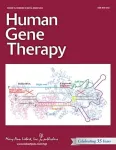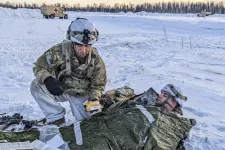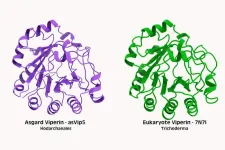(Press-News.org) The U.S. National Science Foundation (NSF) has awarded $26 million to establish a new Gen-4 Engineering Research Center (ERC) named Environmentally Applied Refrigerant Technology Hub (EARTH) to create a sustainable and circular refrigerant economy.
The University of Kansas is the lead institution, joined by partners at Lehigh University, University of Notre Dame, University of Maryland, University of Hawai'i and University of South Dakota. David Vicic, the Howard S. Bunn Distinguished Professor of Chemistry, will lead Lehigh’s team. Mark Shiflett, University of Kansas Foundation Distinguished Professor in the Department of Chemical & Petroleum Engineering, will be the ERC EARTH director.
At the heart of ERC EARTH’s work is reimagining the process for heating, ventilation, air-conditioning and refrigeration (HVACR) systems across the globe. EARTH will develop sustainable, accessible and equitable refrigerant technologies and practices through research, education and innovation that will improve quality of life and combat climate change.
“The EARTH Center will allow participating Lehigh faculty, students and staff to closely interact with the other core institutions to generate new scientific knowledge, engineering and chemical products, environmental policy recommendations, and industry and stakeholder behavioral changes to stimulate HVACR-ecosystem transformations,” Vicic said. “Commercial leaders will also be engaged with EARTH through direct involvement of projects, testbed use, membership programs, training activities and participation at EARTH’s annual meetings, which will allow graduate and undergraduate students to gain unique relationships with industry.”
The open-source educational material that EARTH provides will also benefit HVACR programs at smaller partnering institutions like Pennsylvania College of Technology by updating and refining curricula in a way that would not be possible otherwise.
The interdisciplinary team at Lehigh involves professors Vicic (synthetic chemistry), Lisa Fredin (computational chemistry), Elizabeth Young (molecular spectroscopy), Jessecae Marsh (cognitive psychology) and Todd Watkins (innovation economics and technical entrepreneurship). Watkins will serve as co-lead of the ERC EARTH Innovation Ecosystem group.
ERC EARTH’s multifaceted approach addresses a critical challenge
HVACR systems are widespread throughout society, enabling transportation and preservation of fresh foods, storage of medicines and cooling of buildings. Most current refrigerants are hydrofluorocarbons (HFCs), which have high global-warming potential. As a result of leaks from existing systems and the energy required to operate them, HFCs account for nearly 8% of global greenhouse-gas emissions.
In response, the U.S. and 170 other countries are phasing down HFCs in accordance with domestic and international agreements signed in recent years, which creates a tremendous challenge to responsibly and sustainably replace billions of kilograms of refrigerants.
Working closely with industry partners, EARTH will have the resources and expertise to solve the technical, environmental and economic challenges required to create a sustainable refrigerant lifecycle that will benefit the nation and the world.
“Multidisciplinary research teams will focus on three key areas: promoting the recycling and repurposing of refrigerants, developing transformative refrigerants and creating next-generation cooling and heating technologies with higher energy efficiency,” said Shiflett, who is director of University of Kansas’ Wonderful Institute for Sustainable Engineering.
Lehigh’s team will focus on developing solutions to deal with the reclamation and repurposing of high-global warming potential (GWP) legacy refrigerants. These solutions are needed to prevent millions of metric tons of high-GWP refrigerants from leaking and illegally venting into the atmosphere. Approaches will include new security markers for refrigerant producers to use at ports of entry and regional/local distribution centers; low-cost, energy-efficient separations of individual HFC compounds from recycled mixtures, waste refrigerants and future hydrofluoroolefin blends; and new methodologies for repurposing high-GWP refrigerants into diversified fine and commodity chemicals.
Lehigh’s Chemistry Department has world-renowned expertise in manipulating refrigerant-like molecules, which made it a top choice for leading these studies.
Behavioral data and analyses to improve new technology adoption, foster business model innovation, and identify social, behavioral and business barriers to transitioning to new refrigerants - together with economic analyses that influence future policy making - will support EARTH’s research and will be led by Lehigh researchers.
Building an ongoing innovation ecosystem
The Center’s interacting foundational components go beyond the research project, including engineering workforce development and value creation within an innovation ecosystem that will outlast the lifetime of the ERC.
The Lehigh team, through the Martindale Center for the Study of Private Enterprise, is co-leading those ERC EARTH innovation ecosystem efforts, aimed at accelerating the uptake of new ideas emerging from EARTH research.
“EARTH aims to advance promising technologies by connecting innovators to entrepreneurship and industry resources and partners to tackle key HVACR innovation, entrepreneurship and scale-up challenges by leveraging deep supporting infrastructures across all six partner universities, in order to foster innovation and entrepreneurial mindsets throughout the HVACR research and education ecosystem,” said Watkins, who is executive director of the Martindale Center in the College of Business.
In addition, EARTH’s operational design will cultivate inclusive, interdisciplinary research collaborations and foster workforce development, Shiflett said. This includes partnering of the EARTH team with community colleges and technical schools to ensure availability of the needed workforce at all levels.
The NSF’s Engineering Research Centers bring universities and businesses together to strengthen the competitive position of American industry in the global marketplace.
“NSF's Engineering Research Centers ask big questions in order to catalyze solutions with far-reaching impacts,” NSF Director Sethuraman Panchanathan said. “NSF Engineering Research Centers are powerhouses of discovery and innovation, bringing America's great engineering minds to bear on our toughest challenges. By collaborating with industry and training the workforce of the future, ERCs create an innovation ecosystem that can accelerate engineering innovations, producing tremendous economic and societal benefits for the nation.”
ERC EARTH was selected from among hundreds of proposed centers nationwide. The NSF project is renewable after five years for another $26 million dollars, for a potential effort of 10 years and $52 million.
END
Lehigh University is a core institution of new $26 Million NSF Engineering Research Center
Lehigh University is one of six core institutions of a new U.S. National Science Foundation Engineering Research Center focusing on developing sustainable refrigerants to address climate change
2024-08-21
ELSE PRESS RELEASES FROM THIS DATE:
NJIT biologist awarded $680,000 federal grant to save North Atlantic right whale
2024-08-21
Brooke Flammang, a biologist at New Jersey Institute of Technology (NJIT), has been awarded nearly $680,000 from the National Oceanic and Atmospheric Administration (NOAA) as part of a growing nationwide effort to save the critically endangered North Atlantic right whale (Eubalaena glacialis).
NOAA Fisheries recently unveiled a more than $9 million initiative funded by the Inflation Reduction Act to support a coalition of universities, nonprofits and scientific organizations engaged in the recovery of the species, which has seen its numbers dwindle to roughly 360 individuals ...
University of Kansas awarded $26 million for new Engineering Research Center from National Science Foundation
2024-08-21
LAWRENCE — The National Science Foundation (NSF) has awarded the University of Kansas $26 million to establish a new Gen-4 Engineering Research Center (ERC) —Environmentally Applied Refrigerant Technology Hub (EARTH) — that will create a sustainable and circular refrigerant economy.
NSF’s Engineering Research Centers bring universities and businesses together to strengthen the competitive position of American industry in the global marketplace.
“NSF's Engineering Research Centers ask big questions in order to catalyze ...
Sandia Science & Technology Park injecting billions into state economy
2024-08-21
ALBUQUERQUE, N.M. — The Sandia Science & Technology Park is being credited with playing a critical role in New Mexico’s economy over the last 25 years, creating high-paying jobs and bringing state-of-the-art technologies to the marketplace.
A study by the Mid-Region Council of Governments shows that over that time, businesses located within the technology park paid out $7.7 billion in wages in the five-county region of Bernalillo, Sandoval, Valencia, Torrance and southern Santa Fe counties. It also shows the park generated ...
Marshall University innovators selected for prestigious NIH-funded entrepreneurship program
2024-08-21
HUNTINGTON, W.Va. – Two Marshall University innovators, Brad Profitt, DC, DPT, DScPT, and M’Hamed Turki, M.D., have been selected to participate in the National Institutes of Health (NIH) funded IDeA Regional Entrepreneurship Development (I-RED) Program, facilitated by the XLerator Network.
The NIH’s competitive I-RED program supports the creation of educational products to promote entrepreneurship in academic institutions. XLerator Health, a health care accelerator based in Louisville, Kentucky, assists startup founders like Profitt and Turki in commercializing their businesses and attracting funding.
Profitt is a co-founder ...
Lipid nanoparticle mRNA therapy improves survival in mouse models of maple syrup urine disease
2024-08-21
New Rochelle, NY, August 21, 2024—Researchers from the University of Pennsylvania, Perelman School of Medicine, Gene Therapy Program, and Moderna, have shown that repeated administration of lipid nanoparticle-encapsulated mRNA therapy significantly extended survival and reduced serum leucine levels in a mouse model of maple syrup urine disease (MSUD). Click here to read the article now.
The researchers, led by James Wilson, M.D., Ph.D., from the University of Pennsylvania, Perelman School of Medicine, evaluated a lipid nanoparticle-based treatment approach to address all possible genetic mutations that can cause MSUD.
“Repeated intravenous ...
USAMMDA commercial partner receives FDA emergency use authorization for plasma powder
2024-08-21
A U.S. Army Medical Materiel Development Activity commercial partner received Emergency Use Authorization from the U.S. Food and Drug Administration for the Department of Defense to use octaplasLG Powder—a potentially lifesaving treatment option for blood replacement therapies in certain operational circumstances. Notice of the EUA for this product was received by the company, Octapharma USA, on Aug. 8, 2024.
USAMMDA’s Warfighter Protection and Acute Care Project Management Office, which has a Cooperative Research and Development Agreement with Octapharma USA, manages research and development efforts for several ...
Pennington Biomedical study to explore effects of soy on blood sugar levels
2024-08-21
Pennington Biomedical Research Center’s Dr. Candida Rebello wants to know more about the intersection of blood sugar levels and a diet rich in soy. This intersection is the primary focus of her new study, “Lifestyle Intervention for Improving Metabolic and Motivational Outcomes,” or MOTIVATE, which explores how specific diets can impact blood sugar, and potentially improve mood and energy levels.
When soy seeds are cut, they produce the anti-microbial compound known as glyceollin, which has been shown to improve insulin sensitivity and cognition. The cut soy seeds will be milled into flour and will be included in the diets of some of the participants. The MOTIVATE ...
Giving an antibiotic to all children under 5 in Africa saves lives
2024-08-21
When UC San Francisco research showed that routinely treating children in Sub-Saharan Africa with a common antibiotic could reduce deaths in children under five, the World Health Organization (WHO) moved quickly to recommend the treatment – but only for infants between 1 and 11 months old.
Now, UCSF researchers have shown that treating babies is not enough. The antibiotic must be given to all children up to 5 years old to realize its full benefit, which is considerable: It lowers child mortality ...
Pivotal study supports belzutifan approval for patients with advanced kidney cancer
2024-08-21
RESEARCH SUMMARY
Study Title: Belzutifan Versus Everolimus for Advanced Renal-Cell Carcinoma
Publication: New England Journal of Medicine, August 22, 2024
Dana-Farber Cancer Institute authors: Toni K. Choueiri, MD
Summary: The LITESPARK-005 phase 3 clinical enrolled 746 patients with metastatic clear cell renal cell carcinoma (ccRCC) who had progressed after treatment with both an immune checkpoint inhibitor (ICI) and an anti-angiogenic therapy. Patients were randomized to receive treatment with either belzutifan, a HIF-2α inhibitor, or everolimus. Overabundant HIF-2α is associated with increased cancer-driving activity. At the second interim analysis of this study, ...
Next time you beat a virus, thank your microbial ancestors
2024-08-21
When you get infected with a virus, some of the first weapons your body deploys to fight it were passed down to us from our microbial ancestors billions of years ago. According to new research from The University of Texas at Austin, two key elements of our innate immune system came from a group of microbes called Asgard archaea.
Specifically, viperins and argonautes, two proteins that are known to play important roles in the immune systems of all complex life — from insects to plants to humans — came from the Asgard archaea. Versions of these defense proteins are also present in bacteria, but the versions in complex life forms are ...
LAST 30 PRESS RELEASES:
ASU researchers to lead AAAS panel on water insecurity in the United States
ASU professor Anne Stone to present at AAAS Conference in Phoenix on ancient origins of modern disease
Proposals for exploring viruses and skin as the next experimental quantum frontiers share US$30,000 science award
ASU researchers showcase scalable tech solutions for older adults living alone with cognitive decline at AAAS 2026
Scientists identify smooth regional trends in fruit fly survival strategies
Antipathy toward snakes? Your parents likely talked you into that at an early age
Sylvester Cancer Tip Sheet for Feb. 2026
Online exposure to medical misinformation concentrated among older adults
Telehealth improves access to genetic services for adult survivors of childhood cancers
Outdated mortality benchmarks risk missing early signs of famine and delay recognizing mass starvation
Newly discovered bacterium converts carbon dioxide into chemicals using electricity
Flipping and reversing mini-proteins could improve disease treatment
Scientists reveal major hidden source of atmospheric nitrogen pollution in fragile lake basin
Biochar emerges as a powerful tool for soil carbon neutrality and climate mitigation
Tiny cell messengers show big promise for safer protein and gene delivery
AMS releases statement regarding the decision to rescind EPA’s 2009 Endangerment Finding
Parents’ alcohol and drug use influences their children’s consumption, research shows
Modular assembly of chiral nitrogen-bridged rings achieved by palladium-catalyzed diastereoselective and enantioselective cascade cyclization reactions
Promoting civic engagement
AMS Science Preview: Hurricane slowdown, school snow days
Deforestation in the Amazon raises the surface temperature by 3 °C during the dry season
Model more accurately maps the impact of frost on corn crops
How did humans develop sharp vision? Lab-grown retinas show likely answer
Sour grapes? Taste, experience of sour foods depends on individual consumer
At AAAS, professor Krystal Tsosie argues the future of science must be Indigenous-led
From the lab to the living room: Decoding Parkinson’s patients movements in the real world
Research advances in porous materials, as highlighted in the 2025 Nobel Prize in Chemistry
Sally C. Morton, executive vice president of ASU Knowledge Enterprise, presents a bold and practical framework for moving research from discovery to real-world impact
Biochemical parameters in patients with diabetic nephropathy versus individuals with diabetes alone, non-diabetic nephropathy, and healthy controls
Muscular strength and mortality in women ages 63 to 99
[Press-News.org] Lehigh University is a core institution of new $26 Million NSF Engineering Research CenterLehigh University is one of six core institutions of a new U.S. National Science Foundation Engineering Research Center focusing on developing sustainable refrigerants to address climate change







